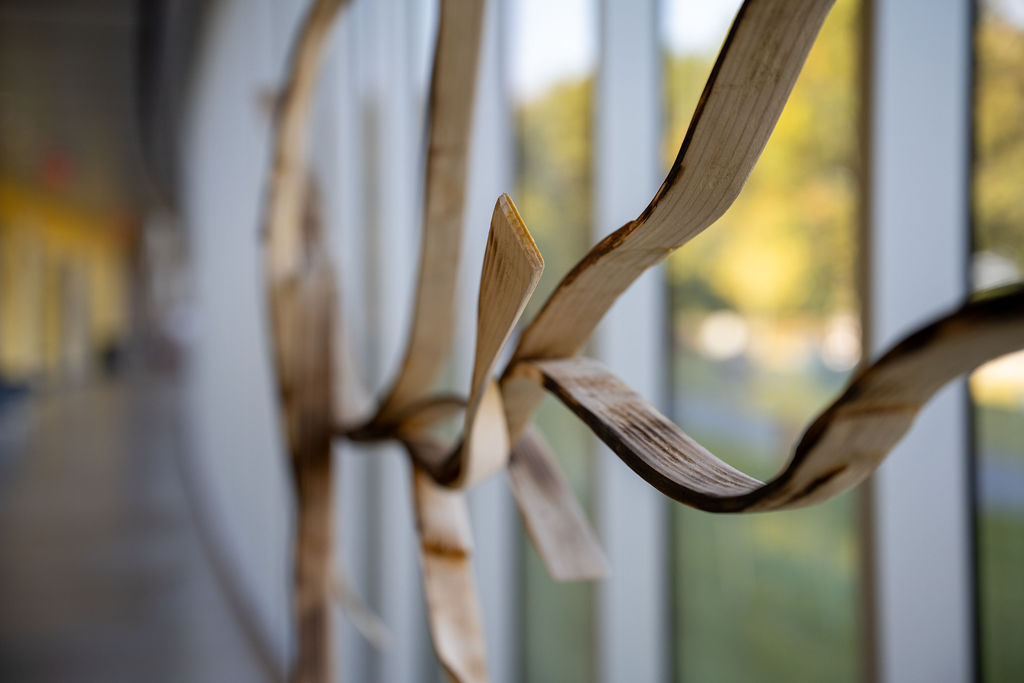In September, Lehigh University welcomed 60 scholars for an international philosophy conference, “Phenomenologies of Mental Health, Well-Being and Flourishing.” The two-day event was spearheaded by Ally Peabody Smith, assistant professor in the College of Health’s (COH) department of population health. She said that the idea was born from discussions with friend and colleague Ellie Anderson, a professor of philosophy at Pomona College (California), conference co-organizer and host of the popular podcast Overthink.
“We thought it would be really interesting to bring together a circle of researchers and students to talk about interdisciplinary approaches and interventions pertaining to mental health and well-being,” Peabody Smith said, “especially given how much is changing in the world right now with ecological change, our political situation and technological innovation.”
Phenomenology is the study of first personal subjective experience. It explores how individuals “interpret experiences via the structure of consciousness, and how we understand the relationship between our embodiment and conscious experiences,” Peabody Smith said. “What differentiates phenomenology from other philosophical approaches is that it’s not focused on any ‘objective’ external reality—instead, it looks at how things (phenomena) appear to individuals and why that might be the case. This sort of methodology can be applied to how we experience mental health.”
Peabody Smith brought on two COH colleagues, Fathima Wakeel, associate professor of population health, and Tracy Nichols, professor and chair of community and global health, as co-organizers to develop a true interdisciplinary event. Promoting health equity by forging unconventional connections between diverse fields is a hallmark of the College of Health approach.
Wakeel, an expert in maternal resilience and women’s health, was immediately interested. “When Ally reached out, I felt really excited because of my focus on resilience, and the focus of the conference being on mental health, flourishing and well-being. All of those constructs mean a lot to me in my work, so it felt like a perfect fit,” Wakeel said.
Like Wakeel, Nichols was also drawn to the interdisciplinary aspect of the conference and wanted to contribute. She is a behavioral scientist whose work spans sexual and reproductive health, substance use, adolescent health, family health and health equity interventions.
“While I have no formal training in philosophy, I enjoy learning about it, and I am really committed to finding ways to bring the humanities and the health sciences together,” said Nichols. “My preferred research method is qualitative, and I also lean towards arts-based approaches.”
The event featured panel discussions on topics ranging from “Relationality and Caretaking” to “Temporality.” The two keynote speakers, Havi Carel, Professor of Philosophy from the University of Bristol, and Matthew Ratcliffe, Professor of Philosophy, University of York, are phenomenologists with expertise in mental health.
COH doctoral students kept things running smoothly behind the scenes, moderated panels and even shared their own work. Jackie Massuda presented a poster entitled “Perceptions of the Mental Well-being Impacts Associated with Taking Breaks at a Hospital Farm among Hospital Workers.” The volunteers were Sandra Boakye, E.J. Rovella, Christina Graham, Aastha Singh, Linlin Cai, Sajib Rana and Kudakwashe Mundove.
Thanks to a Lehigh University Future Makers Activate Mountaintop grant, the event also featured an art installation, “Phenomenologies of Mental Health.” According to Peabody Smith, “We were able to represent 11 fabulous student and faculty artists and their work on experiences of mental health.”
Wakeel said she appreciated how the interdisciplinary nature of the conference expanded her perspective on how to apply philosophical methods to her own research. “In public health, we focus so much on thinking about the impacts on health. We tend to think about things at the aggregate level, and we don’t necessarily think about the nuanced differences among individuals. This was really impactful for me in that way,” she said.
On the other hand, Peabody Smith shared that philosophers are typically focused not on impact, but on getting to the truth of the subject they are researching. The themes of this conference applied their work in the real-world.
“A lot of people really care about the fact that we are facing a mental health crisis globally. There are so many factors impacting our everyday lives,” she said. “It grounds philosophical work in a way that draws attention to the way that really understanding something like depression or flourishing can also be pulled into interventions that are really helping people.”
The organizers point to a roundtable discussion called “Mental Health Community Partners” as a conference highlight, featuring individuals who work in the community to improve mental health outcomes. Panelist Austin Duncan, a COH professor, shared his work in disability community-building. Joining him were Sara Martinez from the Mindful Child Initiative and Connor Moriarty from Reset Outdoors.
“So many people said it was the best conference they’d ever been to,” said Peabody Smith. “Thanks to Ellie, Fathima, and Tracy’s hard work, this was able to happen. It’s definitely been a teamwork situation.”
Nichols shared that the event was a huge success and that she was proud to have played a role in it. “I think I was able to bring in more public health and applied perspectives to designing the format of the conference and in reviewing and selecting presentations,” shared Nichols. “I was also a big proponent of us finding more ways to include the arts and creativity in the conference experience.”
Looking ahead, Peabody Smith and Anderson are editing a volume of selected conference presentations, as well as non-participant solicited papers from experts in the field. The volume is slated to be published with Lehigh University Press in the fall of 2027.
